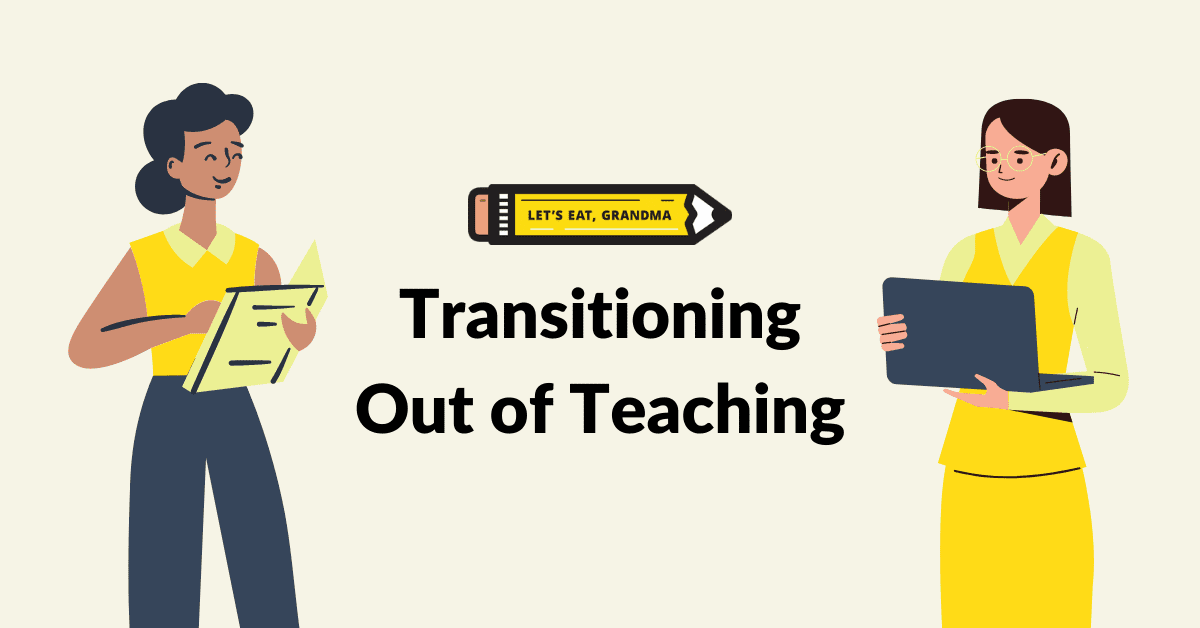A Guide to Transitioning Out of a Teaching Career

Teachers have a diverse skillset that is easily applied to many roles in a variety of different industries. If you’re a teacher looking for a career change to something new, read on to find out how to highlight your professional strengths in the job search.
By: Ashley Dolar | Contributor for Let’s Eat, Grandma
This has been a hard year for teachers. Since March 2020, you have been asked to move mountains for your students in both virtual and in-person environments. You have been their security blankets during a long, uncertain winter. You completed the impossible task of educating our children during a pandemic.
I happen to know firsthand how challenging this year must have been for teachers because I spent eight years at the head of a classroom. It was an amazing experience to help those little faces see their own bright futures every day.
You are superheroes.
Tired of not landing interviews?
Get our free 3-step guide to writing better resume bullet points, featuring 70 ideas for metrics you can use!
However, this unprecedented year has led to a mass exodus in education. Usually, about one in eight teachers leave the profession every year, but this year is different. This year one in four teachers are considering leaving their classrooms for career change.
Are you one of them?
If you find yourself packing up your lesson plans for the last time, you are probably wondering how you are going to transition out of teaching. It’s a specific skillset, but luckily for you, it is one that is easily transferable to a multitude of job possibilities.
Curriculum & Instructional Design

A quarter of teachers in the U.S. are considering leaving the classroom in 2021. Photo by National Cancer Institute on Unsplash
You are already a designer, researcher, and detail guru, so the most obvious transition is to jump into the growing field of curriculum and instructional design. This role probably best fits teachers who are still passionate about education, even though they are ready to step back from the classroom.
As you know, “curriculum” is what the learner will learn and “instruction” is how the learner will learn the material. You will need to stay on top of education trends, state standards, and DEI initiatives. Additionally, this kind of career switch might require additional training courses or an advanced degree.
Sales
If you take on a sales role, you will need to be upbeat, enthusiastic, and persistent. Your teaching experience makes you a natural relationship builder. This will help you talk to customers and learn more about their needs.
You are also a master of the follow-up. Tommy is struggling with subtracting two-digit numbers, so you pull him into small group instruction to follow up. Janet is constantly turning in her homework late, so you make a phone call home to – you guessed it – follow up. As you might imagine, this skill is really handy in sales and business development where the name of the game is closing the deal.
Customer Service
A customer service representative helps people when they are confused, frustrated, and overwhelmed. You need to be able to de-escalate situations and provide a quick, reasonable solution. Sound familiar, teachers?
While these types of positions are usually entry-level, there are certain roles that require more specialized skills, like IT or technical support. If that is appealing to you, you should check out the new Google IT Certificates to get your feet wet or your local community college for a more robust program.
Marketing
If you send home a newsletter or run an Instagram page for your classroom, you are already doing some marketing! This arena is all about building customer relationships and increasing engagement, which is about 99% of teaching last time I checked.
There are a few different types of marketing that naturally fit a teacher’s skillset. For example, content marketing includes writing blog posts, managing social media platforms, and creating customer-facing communications. It’s worth exploring this industry as a freelance writer or marketing consultant as well.
Training & Development

Teachers often find that they are especially good in training roles. Photo by Mr. Bochelly on Unsplash
After years of working with students, you are a practiced communicator who can give clear directions to diverse audiences. You also have a strong background in tracking individual progress and evaluating the effectiveness of instruction. This skillset easily transfers to any training, development, or onboarding role.
In this role, you will probably be working within the human resources department to create engaging learning experiences for employees or volunteers. You might be in charge of designing training materials and leading the corresponding professional development sessions.
Recruiting
You specialize in identifying strengths within your students and building upon them. This core attribute will help you find the best candidates for a specific company or a recruitment agency.
You will need clear communication skills as you will be conducting interviews, crafting emails, and writing detailed job descriptions. You must also possess a high degree of empathy because each candidate is pinning their hopes for a particular job on you!
What’s Next?
Leaving your classroom is a big step, but leaving the world of education is an even bigger change. I suggest networking as much as possible and starting a LinkedIn profile, if you don’t already have one. (There are 55 million companies on the professional networking site and 87% of recruiters regularly use LinkedIn to find candidates!)
You will also need a top-notch resume and cover letter that highlight your teaching experience in a way that non-education industries can understand. For example, “classroom management” translates to “process development and improvement,” while “formative/summative assessments” are “KPI monitoring” in business lingo. These small shifts in language can make a huge difference when it comes to landing a job.
Are you ready for the next step in your career? Check out our resume writing packages to see how our professional writers can help.
Ready for more job search help?
Sign up for a free Senior Writer Resume Critique to see what's holding you back from landing interviews. One of our top professional resume writers will give you personalized feedback on the top 3 items you can improve based on our expert practices!
